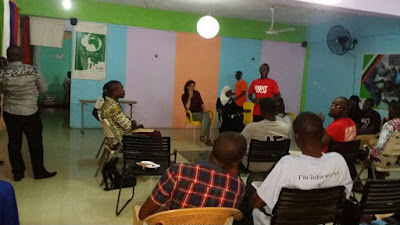Youth SpeakUP to Discuss Teenage Pregnancy this Saturday 10th
Hopin Academy and its partners; RUMNET, YEFL and Ghana
Friends in Denmark have launched the Youth Speak UP project. The project
focuses mainly on youth in some four deprived districts of Tamale, Northern
Ghana; Kumbungu, Savelugu, Saboba and Karaga. Youth Speak Up will be holding
both offline and online discussions this Saturday 10th September 2016
on how to curb Teenage Pregnancy in the identified districts. Teenage pregnancy is defined as an unintended pregnancy
during adolescence. A female teenager can be pregnant as early as age 12 or 13,
although it is usually 14 or older. In Ghana, females represent 51.2 per cent
of the entire population of almost 25 million whereas adolescents represent
22.4 per cent of the total population. The rates of teenage pregnancy in Ghana
are high; of all births registered in the country in 2014, 30 per cent were by
adolescents, and 14 per cent of adolescents aged between 15 and 19 years had
begun childbearing.
Regional assessment of teenage pregnancy in Ghana shows that
the Upper East, Volta, Brong Ahafo, Central and Eastern regions have the
highest regional rates of 14 per cent and above between of 2012 and 2014. Of
these regions the Upper East Region has the highest national prevalence rate of
teenage pregnancy – 15 per cent. The Northern Region has the lowest prevalence
rate of 4.4 per cent and is followed by Greater Accra with 6.6 per cent.
Last Saturday night, 27th, saw active change makers and counselors at Hopin Academy, the Youth Speakup night saw the likes of Miss Blessilla , Maccarthy Lomotey, Ruka Yaro, Mrs Hikmat Baba Dua, Carole Donkers, Mr Sofo, Mr Mash, Mr Mustapha, Zakaria Abdul Hakim Cisse, Clement Boateng, representatives of CHRAJ, and partner radio stations of the project and community based journalist and many many others, they gathered to discuss Violence against Women. Violence against women and girls has many manifestations, including forms that may be more common in specific settings, countries and regions. Violence against women manifests itself as physical, sexual, emotional and economic.
Further analysis of the data between 2012 and 2014 indicates
that Ashanti and Brong-Ahafo regions had an increasing trend of teenage
pregnancy rates over the last three years. It is significant to note also that
no region has shown an annual decreasing trend in the prevalence of teenage
pregnancy.Regionally, Greater Accra has one of the lowest prevalence rate of
teenage pregnancy and the top three districts that have the highest prevalence
rate are Accra Metro, Kumasi Metro and Techiman municipality. The top districts
that recorded the highest prevalence rates of teenage pregnancy are all in
urban centres. In all regions in Ghana, females experience their first sexual
encounter earlier than their male counterparts. Research shows that there is a direct link between levels of
education and the age of the first sexual intercourse experience. The higher
the educational level of the adolescent, the less likely they are to engage in
sexual intercourse at an early age. There had also been significant rise in the
percentage of young adolescents who had a child or were pregnant between the
years of 2008 and 2014. These percentages describe the escalation of teenage
pregnancy percentages with the increase in age.
To address the high rates of teenage pregnancy in Ghana, the
Ministry of Gender, Children and Social Protection convened a nationwide
stakeholders meeting on December 7, 2015, to assess the current level, to
conduct a situation analysis and to strategise for sustained national
sensitisation. In addition, the ministry complied a Mapping Report on Teenage
Pregnancy in Ghana, focusing on the key strategies in addressing it.
An overview of teenage pregnancy in Ghana including its
causes and effects highlighted the importance of understanding the context
surrounding teenage pregnancy and the implications and concerns arising in
Ghana. Linkages to health, educational levels, wealth categories and the
inter-generational transfer of poverty, were made throughout the presentation.
Moving forward, governmental attention must be focused on
information and services to support young women through comprehensive sexuality
education and re-integration strategies for young mothers.
The Ghana Health Service has focused on education as its
main strategy in addressing sexual and reproductive issues in Ghana and with
services predominately focused on the current needs of young unmarried women
Source; www.graphic.com.gh/Sanatu Zambang






Comments
Post a Comment